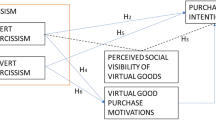Abstract
This study discusses the formation of consumer loyalty in the context of online games. Loyalty to a specific online game may be conceptualized in terms of repeat patronage, switching behavior, and word-of-mouth recommendations toward the game. A conceptual model is proposed. In the model, virtual power-status, incentive utility, relational interacting behavior, and feature enhancement indirectly influence loyalty through the mediation of satisfaction and commitment. Gender is proposed to moderate each model path given that individuals with stronger feminine or masculine identities are likely to make repeated consumption on online games based on different game product choices accordingly. Finally, the implications of the proposed model and suggestions for future research are also discussed.
Similar content being viewed by others
References
Anderson, R.E., Srinivasan, S.S.: E-satisfaction and e-loyalty: a contingency framework. Psychol. Market. 20(2), 123–138 (2003)
Bartsch, R.A., Burnett, T., Diller, T.R., Rankin-Williams, E.: Gender representation in television commercials: updating and update. Sex Roles 43(9/10), 735–743 (2000)
Brady, M.K., Robertson, C.J.: An exploratory study of service value in the U.S.A. and Ecuador. Int. J. Serv. Indus. Manage. 10(5), 469–486 (1999)
Caminal, R., Matutes, C.: Endogenous switching cost in a duopoly model. Int. J. Indus. Organ. 8(3), 353–373 (1990)
Choi, D., Kim, J.: Why people continue to play online games: In search of critical design factors to increase customer loyalty of online contents. Cyber Psychol. Behav. 7(1), 11–24 (2004)
Costa, J.A.: Gender Issues and Consumer Behavior. Sage, London (1994)
Crosby, L.A., Evans, K.R., Cowles, D.: Relationship quality in services selling: An interpersonal influence perspective. J. Market. 54(3), 68–81 (1990)
Crotts, J.C., Erdmann, R.: Does national culture influence consumers’ evaluation of travel services? A test of Hofstede’s model of cross-cultural differences. Manag. Serv. Qual. 10(5), 410–419 (2000)
Csikszentmihalyi, M., Rochberg-Halton, E.: The Meaning of Things: Domestic Symbols and the Self. Cambridge University Press, Cambridge (1981)
Dann, G.: Limitations in the use of nationality and country of residence variables. In: Pearce, D., Butler, R. (eds) Tourism Research: Critiques and Challenges, pp. 88–112. Routledge, London (1993)
Dick, A.S., Basu, K.: Customer loyalty: Toward an integrated conceptual framework. J. Acad. Market. Sci. 22(2), 99–113 (1994)
Eastman, J.K., Fredenberger, B., Campbell, D., Calvert, S.: The relationship between status consumption and materialism: a cross-cultural comparison of Chinese, Mexican, and American Students. J. Market. Theory Pract. 5(1), 52–66 (1997)
Fornell, C.: A national customer satisfaction barometer: the Swedish experience. J. Market. 56(1), 6–21 (1992)
Fournier, S.: Consumers and their brands: developing relationship theory in consumer research. J. Consum. Res. 24(2), 343–373 (1998)
Gefen, D., Straub, D.W.: Gender differences in the perception and use of e-mail: An extension to the technology acceptance model. MIS Q. 21(4), 389–400 (1997)
Geyskens, I., Steenkamp, J.B.E.M., Scheer, L.K., Kumar, N.: The effects of trust and interdependence on relationship commitment: a trans-Atlantic study. Int. J. Res. Market. 13(4), 303–317 (1996)
Ghose, S., Dou, W.: Interactive functions and their impacts on the appeal of Internet presence sites. J. Advert. Res. 38(1), 29–43 (1998)
Gilligan, C.: In a Different voice: Psychological Theory and Women’s Development. Harvard University Press, Cambridge (1982)
Goffman, E.: Gender advertisement. Harper and Row, New York (1979)
Grove, S.J., Pickett, G.M., Laband, D.N.: An empirical examination of factual information content among service advertisements. Serv. Indus. J. 15(2), 216–233 (1995)
Hall, J.E., Shaw, M.R., Lascheit, J., Robertson, N.: Gender differences in a modified perceived value construct for intangible products. In: ANZMEC Conference 2000, Melbourne (2000)
Hodges, M.: Preventing culture clash on the world wide web. MIT’s Technol. Rev. 100, 18–19 (1997)
Hofstede, G.: Culture’s Consequences: International Differences in Work Related Values. Sage, London (1980)
Hofstede, G.: Culture and Organizations. McGraw-Hill, New York (1991)
Holbrook, M.: Aims, concepts and methods for the representation of individual differences in aesthetic response to design features. J. Consum. Res. 13(3), 337–347 (1986)
Krotoski, A.: Online: role-playing fits the bill: Aleks Krotoski ventures into the world of online role playing to discover what women find so attractive about Orcs. Guardian Feb. 6, 5 (2003)
Krugman, H.E.: The measurement of advertising involvement. Public Opin. Q. 30, 583–596 (1966)
Laroche, M., Saad, G., Cleveland, M., Browne, E.: Gender differences in information search strategies for a Christmas gift. J. Consum. Market. 17(6), 500–524 (2000)
Luarn, P., Lin, H.H.: A customer loyalty model for e-service context. J. Electron. Commerce Res. 4(4), 156–167 (2003)
Mattila, A.S., Grandey, A.A., Fisk, G.M.: The interplay of gender and affective tone in service encounter satisfaction. J. Serv. Res. 6(2), 136–143 (2003)
Maxwell, S.: Biased attributions of a price increase: effects of culture and gender. J. Consum. Market. 16(1), 9–23 (1999)
Meyers-Levy, J.: The influence of sex roles on judgment. J. Consum. Res. 14(4), 522–530 (1988)
Meyers-Levy, J., Sternthal, B.: Gender differences in the use of message cues and judgments. J. Market. Res. 28(1), 84–96 (1991)
Moutinho, L., Goode, M.: Gender effects to the formation of overall product satisfaction: a multivariate approach. J. Int. Consum. Market. 8(1), 71–91 (1995)
Oliver, R.L.: A cognitive model of the antecedents and consequences of satisfaction decisions. J. Market. Res. 17(4), 460–469 (1980)
Oumil, A.B., Erdem, O.: Self-concept by gender: A focus on male-female consumers. J. Market. Theory Pract. 5(1), 7–14 (1997)
Pritchard, M.P., Havitz, M.E., Howard, D.R.: Analyzing the commitment-loyalty link in service contexts. Acad. Market. Sci. 27(3), 333–348 (1999)
Raney, A., Arpan, L., Pashupati, K., Brill, D.: At the movies, on the web: an investigation of the effects of entertaining and interactive web content on site and brand evaluations. J. Interact. Market. 17(4), 38–52 (2003)
Rierdan, J., Koff, E., Heller, H.: Gender, anxiety, and human figure drawings. J. Pers. Assess. 46(6), 594–596 (1982)
Riger, S., Gilligan, P.: Women in management: An exploration of competing paradigms. Am. Psychol. 35(10), 902–910 (1980)
Rushton, A., Carson, D.J.: Services—marketing with a difference. Market. Intell. Plan. 5(5/6), 12–17 (1989)
Selnes, F.: An examination of the effect of product performance on brand reputation, satisfaction and loyalty. Eur. J. Market. 27(9), 19–35 (1993)
Tam, J.L.M., Wong, Y.H.: Interactive selling: A dynamic framework for services. J. Serv. Market. 15(5), 379–396 (2001)
Venkatesh, V., Morris, M.G.: Why don’t men ever stop to ask for directions? Gender, social influence, and their role in technology acceptance and usage behavior. MIS Q. 24(1), 115–139 (2000)
Worchel, S., Cooper, J.: Understanding Social Psychology. Dorsey Press, Homewood (1976)
Wright, K.B.: On-line relational maintenance strategies and perceptions of partners within exclusively Internet-based and primarily Internet-based relationships. Commun. Stud. 55(2), 239–253 (2004)
Yi, Y., Jeon, H.: Effects of loyalty programs on value perception, program loyalty, and brand loyalty. J. Acad. Market. Sci. 31(3), 229–240 (2003)
Author information
Authors and Affiliations
Corresponding author
Rights and permissions
About this article
Cite this article
Joe, SW., Chiu, CK. Proposing online game loyalty and its antecedents considering gender as a moderator: a qualitative study. Qual Quant 43, 731–741 (2009). https://doi.org/10.1007/s11135-007-9159-2
Published:
Issue Date:
DOI: https://doi.org/10.1007/s11135-007-9159-2




